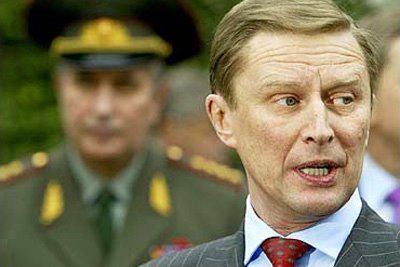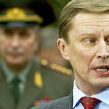
A POTEMKIN DEMOCRACY, A POTEMKIN FREE MARKET, AND A POTEMKIN ARMS RACE
Publication: Eurasia Daily Monitor Volume: 4 Issue: 32
By:

Using language rarely heard since the Cold War, last week Russian President Vladimir Putin blasted the United States, European Union, NATO, Organization for Security and Cooperation in Europe, and the West in general during a major policy speech at a security conference in Munich on February 10. After Putin’s outburst, Russian Defense Minister Sergei Ivanov and U.S. Defense Secretary Robert Gates, who were both in Munich, tried to downplay the confrontational nature of Putin’s speech, asserting that this is not yet a “Cold War.” But members of a U.S. Congressional delegation at the Munich conference deemed Putin’s address to be aggressive and provocative, while articles appeared in Moscow asserting that a “new Cold War” has indeed started (Nezavisimaya gazeta, Vedomosti, February 12).
It is not easy to explain the rationale behind Putin’s anti-Western broadside in Munich. If he had only attacked Washington’s current policies, his view might gain some understanding from European and U.S. politicians who are themselves at odds with the Bush administration. But Putin attacked indiscriminately, causing collateral damage in all quarters, blasting the EU on Kosovo and NATO on expansion, the OSCE for its election monitoring and NGOs for promoting democracy. A pro-Kremlin web site (strana.ru, February 12) lamented that Putin’s address was rejected by virtually everyone — from U.S. Republicans to German Greens. It was reported that there were even hecklers in the audience shouting, “You’ll answer for the murdered journalists!” during Putin’s speech (Rossiiskaya gazeta, February 12).
It was ill-advised of Putin to try to press on Western politicians the idea that any NGO that receives grants from any state budget becomes by implication a political tool of that state’s government, dismissing them as “so-called NGOs that are formally independent, but are financed and in fact controlled” (kremlin.ru, February 10). In Russia, the Kremlin indeed fully controls the so-called NGOs it finances, but Western politicians know from experience that in their world this linkage is not always true.
A genuine new Cold War does not seem possible despite Putin’s rhetoric. First, he is short on resources. Today’s Russia is two times smaller than the old USSR in terms of population and industrial potential. The problem is not only material, but also ideological. The Soviet rulers believed their system of governance was superior. When the belief failed, the system collapsed.
Putin and his Kremlin cohorts do not have any separate ideology and are building in Russia something they believe is a modern Western state. In Munich Putin, who sees himself as a pro-Western reformer, a reborn Peter the Great, not so much challenged the West, as expressed his anguish at not only not being accepted, but instead being perceived by Western public opinion as an Asian dictator who is building a Potemkin democracy with a Potemkin market economy.
Three days before Putin’s bellicose speech, Ivanov unveiled a 5 trillion rubles ($189 billion) military rearmament program. According to Ivanov, 45% of Russia’s weapons will be replaced with new ones by 2015. The acquisitions will include a completely revamped early-warning radar network, new intercontinental missiles, a fleet of supersonic Tu-160 strategic bombers, and 31 new warships, including a new class of Borey strategic nuclear submarines, and aircraft carriers (www.mil.ru, February 7). Ivanov’s spending plan sounds like a replay of the Cold War arms race.
Ivanov boasted that 17 new ICBMs would be procured in 2007. But last month the chief of the Strategic Rocket Force, General Nikolai Solovtsov, spelled out that indeed only five truly new SS-27s (Topol-M) ICBMs will be acquired, while the other 12 are older Soviet-type naval submarine liquid-fuel ballistic missiles SS-N-23 (Sineva) that will be placed on the Soviet-built Delta-4 nuclear submarine Tula to replace the same type of missiles that have been scrapped because of old age. The SS-N-23 in fact has a range less than intercontinental (strana.ru, January 5),
Solovtsev told journalists that there are today 542 operational ground-based ICBMs in Russia, but 70% of them are too old and overdue to be scrapped. By 2015 some 62 new SS-27 ICBMs will be procured, but at the same time some 400 old ICBMs will be removed. Today Russia has 78 strategic Tu-160 and Tu-95 bombers, while by 2015 Ivanov hopes to have 50 operational. The first new sub of the new Borey class (Yuri Dolgoruky) is indeed close to completion, but its new Bulava missiles have regularly failed during tests (see EDM, September 11, 2006), making the new sub a worthless asset.
During the Cold War, the USSR built five aircraft carriers in the Nikolayev shipyard in Ukraine. None of the carriers were ever truly operational: Three have been scrapped, one is being remodeled for India, and the last, the Admiral Kuznetsov, is a crippled vessel that spends most of its time being repaired. There are today no concrete plans to resume aircraft production.
Ivanov expressed doubt that the Russian defense industry will be able to produce the modern weapons Russia military needs. Substantial funds have been earmarked for rearmament in Russia and more is planned to come, but the money will be spent in total secrecy that heightens the opportunities for misappropriation. Ivanov refused to say how many tanks Russia has today, how many new ones will build, who much they will cost, what is the price of any item that is planned to be procured (fednews.ru, February 7).
In essence, Ivanov’s rearmament plan only pretends to be a replica of a Cold War build up, while in fact it is a modest attempt to keep even a fraction of Russia’s present Soviet-made strategic defense holdings operational until 2015. Whether Putin’s salvo is also a charade remains unknown.




